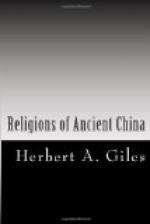In primeval times, we are told, sacrifices consisted of meat and drink, the latter being the “mysterious liquid,” water, for which wine was substituted later on. The ancients roasted millet and pieces of pork; they made a hole in the ground and scooped the water from it with their two hands, beating upon an earthen drum with a clay drumstick. Thus they expressed their reverence for spiritual beings.
“Sacrifices,” according to the Book of Rites (Legge’s translation), “should not be frequently repeated. Such frequency is an indication of importunateness; and importunateness is inconsistent with reverence. Nor should they be at distant intervals. Such infrequency is indicative of indifference; and indifference leads to forgetting them altogether. Therefore the superior man, in harmony with the course of Nature, offers the sacrifices of spring and autumn. When he treads on the dew which has descended as hoar-frost he cannot help a feeling of sadness, which arises in his mind, and which cannot be ascribed to the cold. In spring, when he treads on the ground, wet with the rains and dews that have fallen heavily, he cannot avoid being moved by a feeling as if he were seeing his departed friends. We meet the approach of our friends with music, and escort them away with sadness, and hence at the sacrifice in spring we use music, but not at the sacrifice in autumn.”
“Sacrifice is not a thing coming to a man from without; it issues from within him, and has its birth in his heart. When the heart is deeply moved, expression is given to it by ceremonies; and hence, only men of ability and virtue can give complete exhibition to the idea of sacrifice.” It was in this sense that Confucius warned his followers not to sacrifice to spirits which did not belong to them, i.e. to other than those of their own immediate ancestors. To do otherwise would raise a suspicion of ulterior motives.
Ancestral Worship.—For the purpose of ancestral worship, which had been practised from the earliest ages, the Emperor had seven shrines, each with its altar representing various forefathers; and at all of these a sacrifice was offered every month. Feudal nobles could have only five sets of these, and the various officials three or fewer, on a descending scale in proportion to their rank. Petty officers and the people generally had no ancestral shrine, but worshipped the shades of their forefathers as best they could in their houses and cottages.




